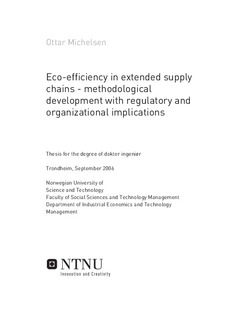| dc.contributor.author | Michelsen, Ottar | nb_NO |
| dc.date.accessioned | 2014-12-19T14:26:50Z | |
| dc.date.available | 2014-12-19T14:26:50Z | |
| dc.date.created | 2008-02-19 | nb_NO |
| dc.date.issued | 2006 | nb_NO |
| dc.identifier | 123575 | nb_NO |
| dc.identifier.isbn | 82-471-8210-6 | nb_NO |
| dc.identifier.uri | http://hdl.handle.net/11250/265611 | |
| dc.description.abstract | The purpose of this thesis is to contribute to the development and understanding of ecoefficiency assessments for extended supply chains. Using a methodological approach, the main outcome is a consistent methodology to assess the eco-efficiency for extended supply chains. The methodology allows comparisons both between different extended supply chains, e.g. the life cycle of different products, and also within an extended supply chain to reveal which processes are the most important for the value performance and the environmental performance, and to determine the contributions of supply chain partners to this performance. The methodological development also includes a proposal for how land use impacts on biodiversity should be included in the environmental assessments.
The methodological approach is used to reveal regulatory and organizational implications for the extended supply chains. In a case study on furniture production the assessments of eco-efficiency are used in two ways: to provide recommendations about new regulations that could motivate improvements in eco-efficiency performance of the products; and, to suggest organizational changes that could and should be performed to realize the potential for improvement.
This thesis demonstrates that the methodological, regulatory and organizational aspects of eco-efficiency are closely interlinked and must be used in combination to realize the potential for improvement.
The methodological recommendations are believed to be valid for all extended supply chains, while the regulatory and organizational implications are case specific. The approach used to derive with the recommendations should be transferable to other extended supply chains.
This thesis shows how measures of eco-efficiency can be used in the search for a path to sustainability. However, eco-efficiency must not be misinterpreted as sustainability since eco-efficiency only deals with relative and not absolute values, and does not incorporate social issues. | nb_NO |
| dc.language | eng | nb_NO |
| dc.publisher | Fakultet for samfunnsvitenskap og teknologiledelse | nb_NO |
| dc.relation.ispartofseries | Doktoravhandlinger ved NTNU, 1503-8181; 2006:216 | nb_NO |
| dc.relation.haspart | Michelsen, Ottar; Fet, Annik Magerholm; Dahlsrud, Alexander. Eco-efficiency in extended supply chains: A case study of furniture production. Journal of Environmental Management. 79: 290-297, 2006. | nb_NO |
| dc.relation.haspart | Michelsen, Ottar. Eco-efficiency in redesigned extended supply chains; furniture as an example. Quantified eco-efficiency in theory and practice: 163-179, 2007. | nb_NO |
| dc.relation.haspart | Michelsen, Ottar. Investigation of relationships in a supply chain in order to improve environmental performance. Clean Technologies and Environmental Policy. 9(2): 115-123, 2007. | nb_NO |
| dc.relation.haspart | Michelsen, Ottar; Solli, Christian; Strømman, Anders Hammer. Environmental impact and added value in forestry operations in Norway. Journal of Industrial Ecology, 2008. | nb_NO |
| dc.relation.haspart | Michelsen, Ottar. The importance of land use impact on biodiversity in an assessment of environmental performance of wood products. International Journal of life Cycle Assessmanet. 13: 22-31, 2008. | nb_NO |
| dc.title | Eco-efficiency in extended supply chains – methodological development with regulatory and organizational implications | nb_NO |
| dc.type | Doctoral thesis | nb_NO |
| dc.contributor.department | Norges teknisk-naturvitenskapelige universitet, Fakultet for samfunnsvitenskap og teknologiledelse, Institutt for industriell økonomi og teknologiledelse | nb_NO |
| dc.description.degree | dr.ing. | nb_NO |
| dc.description.degree | dr.ing. | en_GB |
